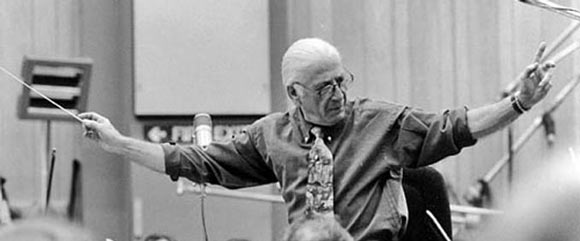
Jerry Goldsmith was an American composer and conductor. He was an instrumental personality in Hollywood; his film scores helped him achieve exceptional popularity and success.
Jerry Goldsmith was born on February 10, 1929 in Los Angeles, California. At the age of six, he started experimenting with the piano and at age thirteen, he would start taking lessons with the renowned Polish Pianist Jakob Gimpel. In 1945, Goldsmith started taking lessons with the Italian Composer Mario Castelnuovo-Tedesco, who was famous for having trained musical legends, including John Williams and André Previn. Goldsmith furthered his musical education at the University of Southern California. There he met his idol, Miklos Rosa, who wrote the soundtrack to the film “Spellbound”. Goldsmith later studied at the Los Angeles City College, where he also worked as an assistant conductor.
Goldsmith’s professional career started off when he was appointed as a clerk typist for CBS Network’s Music Director, Lud Gluskin. Soon, Goldsmith was writing scores for radio shows, including “CBS Radio Workshop”, “Romance”, and “Frontier Gentleman”. Goldsmith’s talents was noticed by CBS’s television department, and soon he was called upon to write scores for television series, including the highly popular “Twilight Zone”, “Playhouse 90” and “Climax!”
After Goldsmith composed the score for NBC’s “Thriller”, American Composer Alfred Newman recommended Goldsmith to Universal Studios to write the score for the classic western film, “Lonely Are the Brave”. The score was so successful that Goldsmith was immediately commissioned to write the score for another Universal Studios film, “Freud: The Secret Passion”. His score for “Freud” was his first work to receive an Academy Award Nomination. Goldsmith then embarked on a collaborative project with director Franklin Schaffner to write the score for “The Stripper”. Goldsmith ended up writing the scores for most of Schaffner’s future films, including the highly famous “Planet of the Apes”, “Papillion”, “The Boys are from Brazil” and “Patton”.
Goldsmith was also credited for his fantastic scores for war-movies. His 1965 score for “In Harm’s Way” and his 1967 score for the legendary naval war movie “The Sand Pebbles” are considered all time classics (“The Sand Pebbles” also awarded Goldsmith an Academy Award Nomination). He also wrote the score to the World War I themed movie “The Blue Max”. His score for the “Planet of the Apes” is also considered the first score ever to be composed in the adventurous avant-garde style, with the usage of looping drums and steel mixing bowls.
He is also known for composing and recording the score for “Chinatown” in only ten days after the original composer’s (Phillip Lambro) score was rejected. Perhaps Goldsmith’s greatest and most recognized film score was his composition for the science fiction epic “Star Trek: The Motion Picture”. He went on to compose plenty of scores for the Star Trek franchise, including “Star Trek: Nemesis” and the immensely popular television series “Star Trek: The Next Generation”.
Goldsmith’s last score was completed in 2003, and it was for “Looney Tunes: Back in Action”. In a career which spanned over fifty years, Goldsmith was nominated for the Academy Award eighteen times, the Grammy Award six times, and the Golden Globe Award four times. He also won an Oscar for his revolutionary score for “The Omen”. Jerry Goldsmith died on July 21, 2004, in Beverly Hills, California due to complications from Colon Cancer.